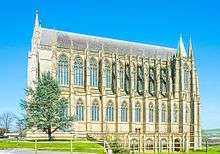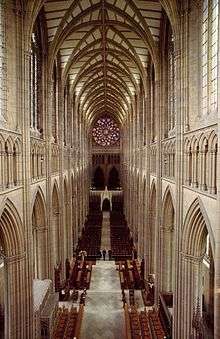Lancing College Chapel
| Lancing College Chapel | |
|---|---|
| Chapel of St Mary and St Nicholas, Lancing | |
 | |
| Location | Lancing, West Sussex |
| Country | United Kingdom |
| Denomination | Church of England |
| Website | Lancing College Website |
| History | |
| Founded | 1848 |
| Founder(s) | Nathaniel Woodard |
| Dedicated | 1978 by Archbishop Coggan |
| Architecture | |
| Architect(s) | R.H Carpenter/William Slater |
| Style | Gothic Revival with French Influences |
| Years built | 1868 to 1977 |
| Groundbreaking | 1868 |
| Completed | 1977 |
| Specifications | |
| Height | 90ft (27.4m) - Vaulting Height |
| Laity | |
| Verger | Adam Wilson |
Lancing College Chapel is the chapel to Lancing College in West Sussex, England, and is considered one of the finest examples of Gothic Revival architecture anywhere.[1] The chapel was designed by R.H Carpenter and William Slater. The foundation stone of the college chapel was laid in 1868 and, although building work stopped in 1977, the chapel remains unfinished.[2] The chapel was dedicated to St Mary and St Nicolas in 1911 but the college had worshipped in the finished crypt from 1875. The chapel is built of Sussex sandstone from Scaynes Hill. It is a Grade I listed building and the largest school chapel in the world.[3]
Architecture

Lancing College Chapel is one of the tallest interior vaulted churches in the United Kingdom. The apex of the vaulting rises to 90 ft (27.4m) above the floor.[4] The original plans called for a tower at the Northern Side and the foundations for it were laid but not used; the tower would have raised the height to well over 300ft (90m). The chapel design is based on 13th Century English Gothic, with French influences. It follows a standard English Gothic plan, with a triforium and a very high clerestory. The French influences are noticeable not just in the massive clerestory, but also in the apse and the massive rose window on the West End. The rose window, designed by Stephen Dykes Bower, was completed in 1977, and is the largest rose window in England, being 32 ft in diameter. A stained glass window was commissioned in memory of Trevor Huddleston OL; it was consecrated by Desmond Tutu on 22 May 2007.
The tomb of the founder of the school, Nathaniel Woodard is a prominent feature. Woodard had insisted that the chapel be built to its full height at one end first, so that if he died before completion the height could not be cut down to save money.
Inside can be found three organs. The eastern organ is a two-manual mechanical organ by the Danish firm Frobenius; it was installed and voiced in situ in 1986. That year also marked the completion of the rebuild of the four-manual Walker organ at the west end of the chapel[5] - both organs were showcased in an opening concert by the American organ virtuoso, Carlo Curley.
The chapel is open daily and attracts thousands of visitors every year. It is open from 10am to 4pm on Mondays to Saturdays, and 12pm to 4pm on Sundays.
Future
The Friends of Lancing College Chapel hope to finish the West End by building the porch which was supposed to connect the chapel to the nearby college buildings. They aim to raise over £4 million to enable this to happen.[6]
References
- ↑ http://www.lancingcollege.co.uk/709/life-at-lancing/chapel
- ↑ http://www.lancingcollege.co.uk/2954/life-at-lancing/chapel/friends-of-lancing-chapel
- ↑ Cities, Events, Accommodation & Attractions in South East England
- ↑ http://www.visitworthing.co.uk/what-to-do/lancing-college-chapel-p45563
- ↑ The History of the English Organ. Stephen Bicknell, Cambridge University Press, 1999
- ↑ http://www.lancingcollege.co.uk/userfiles/lancing/pdfs/FoLC/Lancing%20Chapel%20Future.pdf
Coordinates: 50°50′48″N 0°18′09″W / 50.84667°N 0.30254°W